Revealed: how Tory politicians fought plans to tackle air pollution
Guardian investigation finds 17 MPs, candidates or associations took out 50 ads criticising a clean air zone
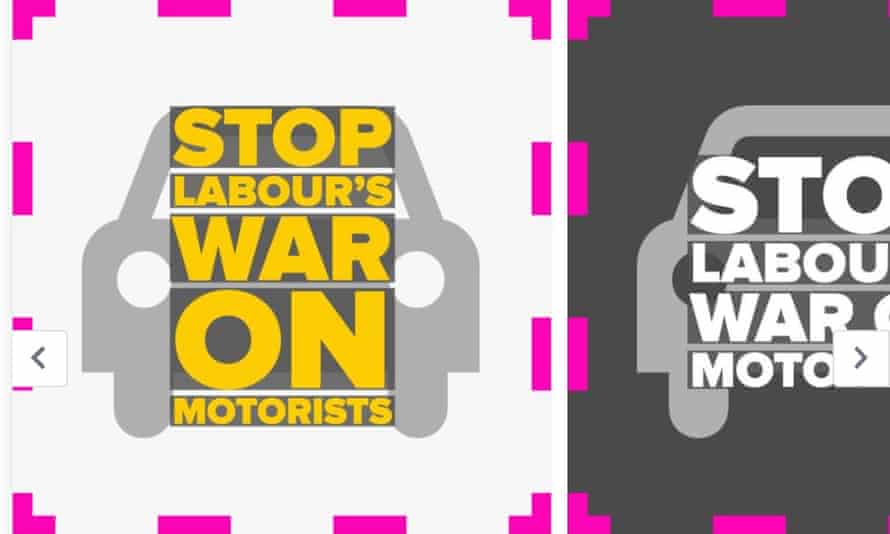
Conservative councillors, MPs and local associations have vocally opposed measures to clean up air pollution, often in opposition to government policy, a Guardian investigation has found.
Transport decarbonisation is one of the government’s “priority action areas” at the upcoming Cop26 global climate talks. However, cities in the UK have been slow to adopt clean air zones, schemes that deter the use of older, more polluting vehicles and incentivise cleaner forms of transport. Only three cities currently operate a CAZ.
There are 25 council areas covered by clean air zone proposals that also have more than one Conservative councillor. Tory councillors opposed schemes in about half of these (13).
The Guardian also analysed Facebook advertising around clean air zones and found 17 Conservative MPs, candidates or associations took out 50 adverts criticising a clean air zone, often before local elections.
Responding to the Guardian’s findings, Andrea Lee, the clean air campaign manager at the environmental charity Client Earth, said: “The government isn’t doing enough to tackle air pollution. Ministers’ approach to tackling the air pollution crisis has left local authorities to do the heavy lifting.
“This has mostly led to delays and weak proposals as local authorities often lack the resources, capacity and, in too many cases, the leadership to get to grips with the problem.”
In the 32 council areas with a Labour group, Labour councillors opposed schemes in just five. However, local Conservatives have not been universally opposed, supporting clean air zones in a number of areas including Dundee, Aberdeen, Bath and North East Somerset and Oxfordshire.
The Guardian’s Facebook analysis found clean air zones were a contentious topic in the run-up to local elections, with about a quarter of the 593 clean air zone ads placed in the month to polling day. In May, Birmingham Conservatives paid for an ad that read: “Help stop Labour’s war on motorists by … opposing Labour’s ‘travel’ tax”. A clean air zone was introduced in Birmingham in June, the first outside London to charge private cars.
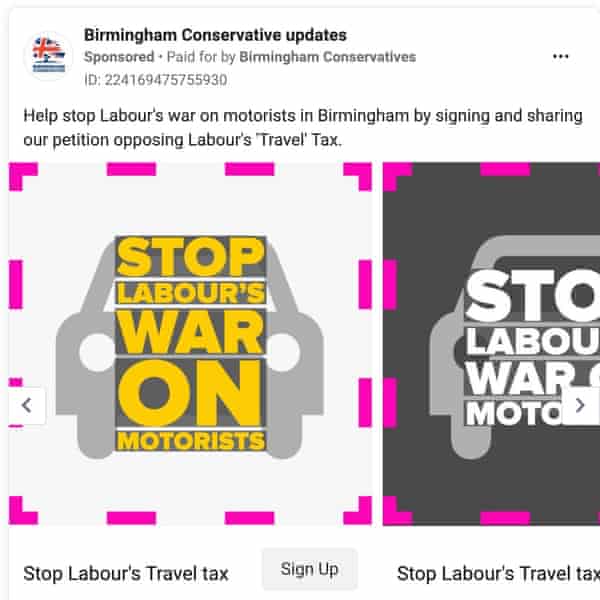
Councillor Robert Alden, the leader of the Birmingham Conservative Group, told the Guardian the clean air zones had “been shown in the council’s own reports to penalise the least well off in Birmingham and [failed] to deliver clean air compliance”. Alden said the Conservative group favoured investing in “green infrastructure”.
Opposition to clean air zones was also a campaign issue in Newcastle, where the local Conservative party took out 11 ads criticising the Tyneside clean air zone proposals before the 2019 local elections. One ad read: “Time is running out. This is our last chance to stop Labour’s plans for a GBP12.50 a day car tax.” The Tyneside clean air zone is expected to launch in July 2022, 18 months later than planned.
The Labour party placed 56 ads mentioning clean air zones, all of which were positive – the majority paid for by the London Labour party before the expansion of the capital’s ultra-low emission zone (Ulez).
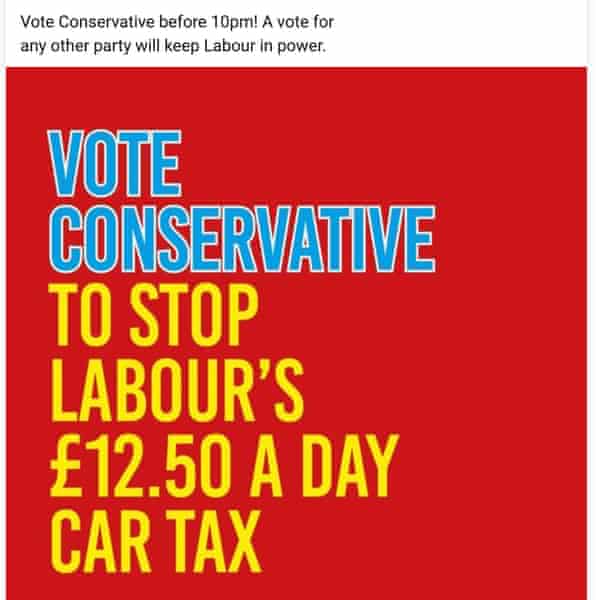
In 2018, judges told the government to bring air pollution levels within legal limits in the shortest possible time, after being taken to court three times by Client Earth. More than 60 councils were directed to improve their air quality, whether through clean air zones or other means, but only London, Bath and Birmingham have a clean air zone in operation. Other cities including Glasgow and Oxford enforce a low-emission zone affecting buses only.
Some councils cancelled clean air zone plans after improvements in air quality during the pandemic when lockdown caused traffic volumes nosedive initially. According to research by Green Alliance, traffic has since returned to pre-lockdown levels in a number of cities that cancelled clean air zone plans, including Southampton and Leeds.
Lee, of Client Earth, said: “Road transport, especially diesel vehicles, is the main source of illegal air pollution in our towns and cities. Councils should not rely on temporary dips in pollution experienced during lockdown to evade the urgent need to clean up our air on a lasting basis.”
Quick GuideClean air zones explainedShow
What are clean air zones?
The government defines a clean air zone as ‘an area where targeted action is taken to improve air quality’. They often involve charging the most polluting vehicles entering the zone.
What vehicles are affected?
There are four different types of clean air zone:
CAZ A – Buses, coaches, taxis and private hire vehicles
CAZ B – Buses, coaches, taxis, PHVs and heavy goods vehicles
CAZ C – Buses, coaches, taxis, PHVs, HGVs, light goods vehicles and minibuses
CAZ D – Buses, coaches, taxis, PHVs, HGVs LGVs, minibuses and cars
Which cities operate clean air zones?
London and Birmingham are the only cities whose clean air zones charge private cars. Bath operates a CAZ C, exempting private cars and motorcycles.
–
Philippa Borrowman, a policy adviser at Green Alliance, said successful clean air zones should be implemented as a broader programme of transport decarbonisation. “We believe you have to do this alongside improving public transport, it can’t just be a standalone piece,” she said.
“Because if you’re putting a zone [charging] private cars in an area where there’s no public transport or it’s expensive then it is completely unfair.”
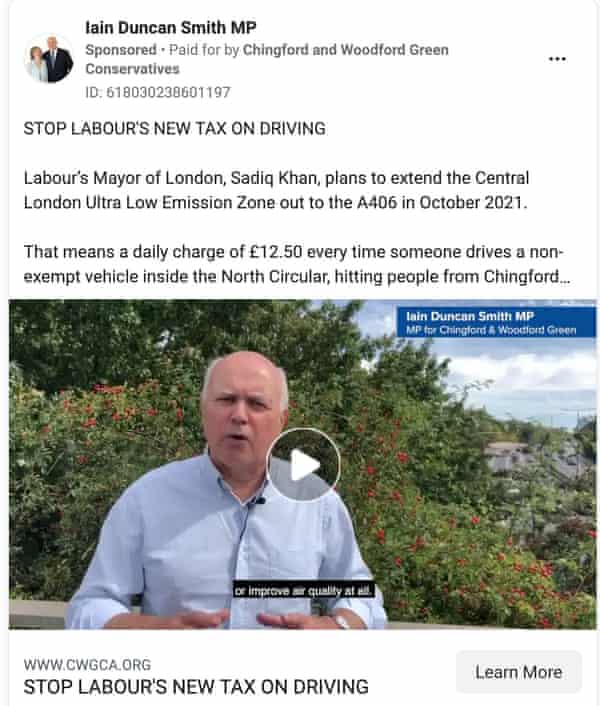
Borrowman highlighted other examples of successful mitigation strategies, including scrappage schemes and investments in safe cycling infrastructure.
The Facebook analysis also revealed several anti-clean air zone ads placed by thinktanks and lobbyists with links to the Conservative party.
Companies owned by Thomas Borwick, the former chief technology officer at Vote Leave and Cambridge Analytica consultant, placed three Facebook adverts criticising London’s Ulez. The TaxPayers’ Alliance – a libertarian thinktank founded by Matthew Elliott, the former chief executive of Vote Leave – also placed two Facebook ads criticising the Ulez.
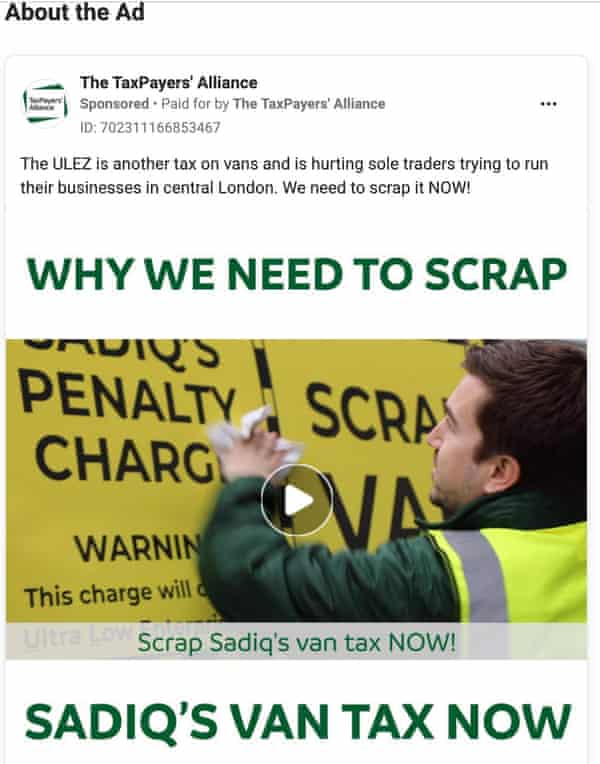
The most active lobby group was EcoCentral UK, which placed eight ads opposing clean air zone schemes in London, Bristol and Bath. “We are sick and tired of the tax hikes and the bans in the name of ‘saving the planet'”, read one ad. “Join us to stop the war on motorists.”
Eco Central UK, whose Facebook page has since been deleted, was described by Desmog as a “Welsh pro-Brexit group … promoting climate science denial.”
A Conservative spokesman said: “Local authorities are best placed to address the issues they face in their local areas, working with their local communities and businesses.” The spokesman also said the government was implementing a GBP3.8bn plan to clean up transport.
A spokesperson for the Department for Environment, Food and Rural Affairs pointed to “significant” improvements in air quality since 2010 and said the government was committed to helping councils achieve compliance with NO2 legal limits.